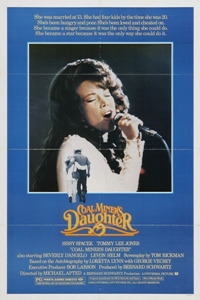Coal Miner's Daughter (NR) ★★★
 In terms of content, if not style, Coal Miner's Daughter would fit with the spate of musician-related biopics that have dotted the recent landscape. And, although central figure Loretta Lynn (Sissy Specek) never had the same kind of Billboard Top 100 success as Elvis, Elton John, or Whitney Houston (to name a few), she dominated the country charts for more than a decade. Made under the auspices of British filmmaker Michael Apted, the movie adopts a low-key dramatic tone rather than the flashy, kitschy one favored by Rocketman, Elvis, and I Wanna Dance with Somebody. Considering that Apted's legacy is tied to the long-running documentary project, The Up Series, this is unsurprising. Although the director occasionally ventured into high-profile territory (he made the 007 entry The World Is Not Enough as well as Gorillas in the Mist and The Voyage of the Dawn Treader), he was most comfortable with scripts that focused on characters.
In terms of content, if not style, Coal Miner's Daughter would fit with the spate of musician-related biopics that have dotted the recent landscape. And, although central figure Loretta Lynn (Sissy Specek) never had the same kind of Billboard Top 100 success as Elvis, Elton John, or Whitney Houston (to name a few), she dominated the country charts for more than a decade. Made under the auspices of British filmmaker Michael Apted, the movie adopts a low-key dramatic tone rather than the flashy, kitschy one favored by Rocketman, Elvis, and I Wanna Dance with Somebody. Considering that Apted's legacy is tied to the long-running documentary project, The Up Series, this is unsurprising. Although the director occasionally ventured into high-profile territory (he made the 007 entry The World Is Not Enough as well as Gorillas in the Mist and The Voyage of the Dawn Treader), he was most comfortable with scripts that focused on characters.
Although Lynn's career was noteworthy, her volatile marriage to Doolittle Lynn (Tommy Lee Jones) provides the film's meat and potatoes. Thiers was an extraordinary love story, peppered with instances of infidelity and mutual abuse. Coal Miner's Daughter sugarcoats nothing, proffering a warts-and-all behind-the-scenes look at a union that was romanticized by the media. Although Coal Miner's Daughter covers only the early years of their time together (roughly the mid-1940s until 1970), they were married for nearly 50 years (until his death in 1996).
At the time Sissy Spacek made Coal Miner's Daughter, she was 30 years old. That matched Lynn's age during the bulk of the film (the 1960s) but requires a suspension of disbelief in the early scenes when Lynn is in her teens. Apted called his decision not to cast a younger actress for these sequences "an artistic choice." Certainly, Spacek's performance never wavers and, once one accepts that the character is intended to be a lot younger than she looks, it's not a distraction. Her performance, the one standout aspect of an otherwise good-but-not-great motion picture, was honored with an Oscar. The actress did all her own singing and is a respectable facsimile. Originally, it was intended to have Lynn overdub Spacek's singing but, after hearing the actress' rendition of the songs, Apted opted against it. Although Lynn was involved in the production, she is never heard on the soundtrack.
For Tommy Lee Jones, this was something of a breakthrough role. Prior to Coal Miner's Daughter, his highest profile part had been in the box-office bomb, The Betsy. His portrayal of Doolittle Lynn got him noticed; he would go on to appear in The Executioner's Song and Lonesome Dove before making a jump to the A-list with The Fugitive. Although most of Coal Miner's Daughter focuses on the interactions between Spacek and Jones, solid supporting turns are provided by Beverly D'Angelo as Patsy Cline and Levon Helm as Loretta's coal-mining father, Ted.
Coal Miner's Daughter uses a linear storyline based primarily on Lynn's 1976 autobiography of the same name. It starts in 1945 as 13-year old Loretta, one of eight children in the Webb family, first sets eyes on the handsome, brash 20-year old, Doolittle Lynn. Within two years, the pair have married. To gain the approval of Loretta's father, Ted, Doolittle makes two promises: (1) never to strike Loretta, and (2) never to take her away from Butcher Hollow, Kentucky. He ultimately breaks both.
By the time Loretta is 19, she has four children. Unable to endure the brutal conditions of the coal mine, Doolittle transplants his family to Washington State. While there, Loretta begins local weekend singing engagements (with Doolittle's full encouragement). This leads to cutting a record, the first single of which is "I'm a Honky Tonk Girl." Doolittle and Loretta go on a promotional tour of local radio stations, pushing for DJs to play the tune. As a result of this, "I'm a Honky Tonk Girl" hits the country charts, earning Loretta a chance to appear on the Grande Ole Opry, enjoy further success, and befriend one of her idols, Patsy Cline. Around the same time, her father dies back in Kentucky.
Although Lynn's story is ripe for opportunities to ramp up the melodrama as in a country ballad, Apted resists, preferring to keep things even-keel. Emotional reactions percolate gradually through this approach. The mutual domestic violence isn't overdone. Typically occurring when Doolittle is drunk, it's not depicted in a sensationalistic fashion and doesn't present Loretta as a punching-bag. On at least one occasion, Doolittle comes out of one of these spats in a far worse condition than his wife.
Appreciating Lynn's music isn't a prerequisite for enjoying Coal Miner's Daughter. The characters are well-delineated and the story is sufficiently engaging for the motion picture to stand on its own merits irrespective of a viewer's affinity for the main character's song catalog. It goes without saying, however, that those with a warm spot for country music (and Lynn's work in particular) will get more out of the film. It could be argued that Coal Miner's Daughter developed a template for the modern musical biopic - one that has gotten extensive use in the last half-dozen years with an increasing number of entries into the genre. The simplicity and lack of excess sets Coal Miner's Daughter apart and gives it a stronger dramatic backbone than many of the movies to follow it.
© 2023 James Berardinelli
To get the full Quicklook Films experience, uncheck "Enable on this Site" from Adblock Plus
box office top 10

Challengers Released: April 26, 2024 Cast: Zendaya, Josh O'Connor 15M

Unsung Hero Released: April 26, 2024 Cast: Daisy Betts, Joel Smallbone 7.8M

Godzilla x Kong: The New Empire Released: March 29, 2024 Cast: Rebecca Hall, Brian Tyree Henry 7.2M

Civil War Released: April 12, 2024 Cast: Kirsten Dunst, Wagner Moura 7M

Abigail Released: April 19, 2024 Cast: Melissa Barrera, Dan Stevens 5.3M

The Ministry of Ungentlemanly Warfare Released: April 19, 2024 Cast: Henry Cavill, Eiza Gonzalez 3.9M

Kung Fu Panda 4 Released: March 8, 2024 Cast: Jack Black, Viola Davis 3.6M

Ghostbusters: Frozen Empire Released: March 22, 2024 Cast: Paul Rudd, Carrie Coon 3.3M

Dune: Part Two Released: March 1, 2024 Cast: Timothée Chalamet, Rebecca Ferguson 2M

Boy Kills World Released: April 26, 2024 Cast: Bill Skarsgård, Famke Janssen 1.7M






